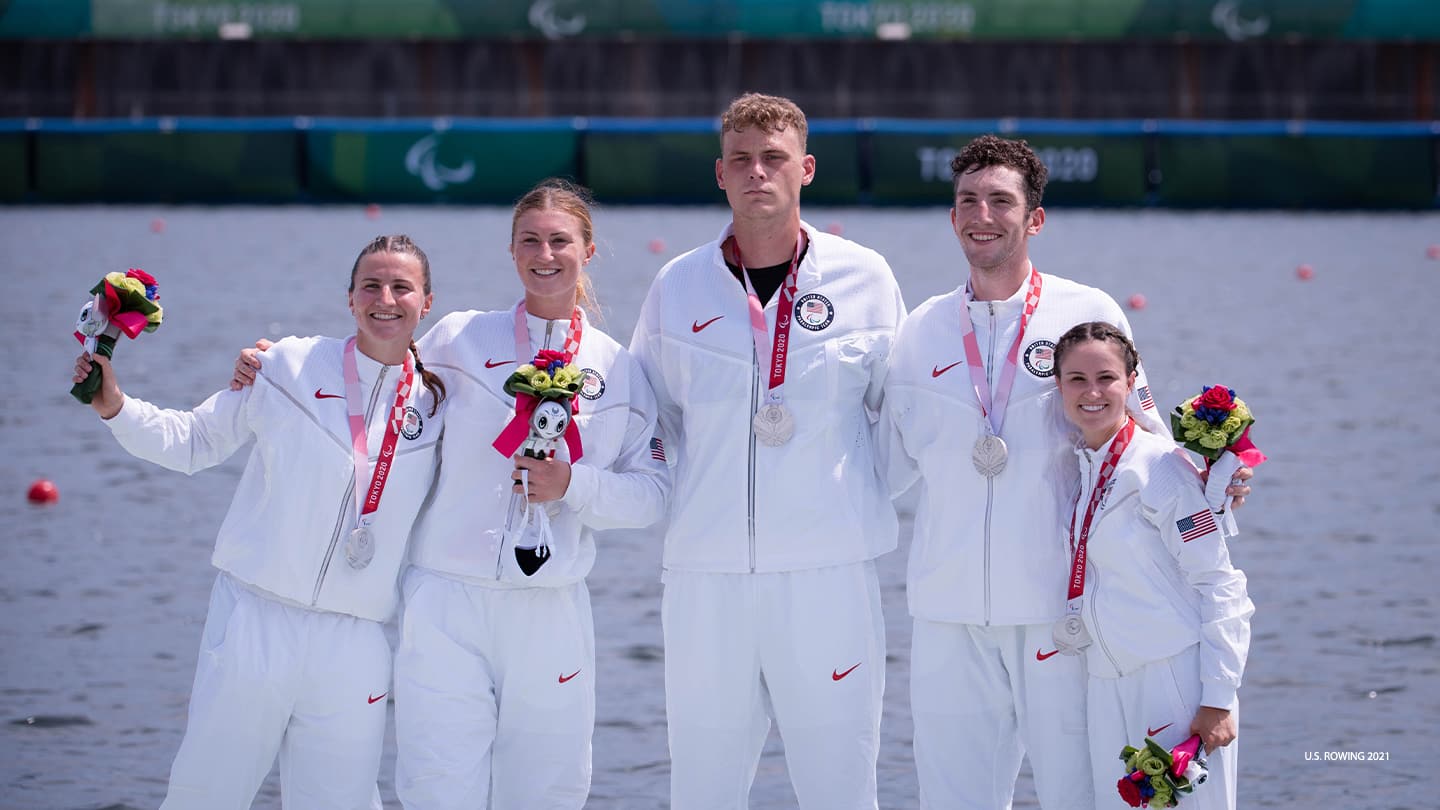
Rower Dani Hansen Anything But Disappointed With Silver At Paralympic Games
by Karen Price

Team USA celebrates winning silver in the PR3 Mixed Coxend Four at the Paralympic Games Tokyo 2020 on Sept. 29 2021 in Tokyo.
Dani Hansen was excited enough just to be back in her hometown of Patterson, California, with her family after returning from the Paralympic Games Tokyo 2020.
She had no idea that her hometown was pretty excited to have her back, too.
So when her mom played it off like they were just going for a drive to meet someone and took the two-time rowing silver medalist into the middle of town, Hansen was shocked to see a crowd of people gathered holding signs and American flags to celebrate her return.
“She drove around (the town circle) once and then she was like, ‘I’m going to drive around a second time so you should take a video,’” said Hansen, 27. “I was already crying. I took out my phone and took a video the second lap around. It was really, really sweet. I got to see people I haven’t seen in a long time. It was a great way to kick off my time at home.”
Hansen was a member of the PR3 mixed coxed four with coxswain team that, for the second time in a row, captured silver at the Paralympic Games. The Americans led the race for a bit at the beginning but were overtaken by Great Britain, which pulled away after the midway point and went on to win gold in 7:09.08. The U.S. was 11 seconds back and seven seconds ahead of France in third place.
It’s become a familiar refrain at the Games and world championships. Great Britain is now unbeaten in 11 years, and it was the seventh consecutive silver at the world level for the U.S.
But if anyone thought the U.S. wasn’t happy with the result, they’d be wrong.
“We talked about it after the race that we all really did everything that we practiced, if not more,” said Hansen, who has Erb’s palsy. “(Great Britain) is just a really awesome team and it was cool to be able to race them and do as well as we did. I came out super proud. I watched the race later and heard the announcer say the U.S. must be really disappointed in silver and I was like no way! Are you kidding me? There was so much work put into getting that, especially the last two years, so I just felt really awesome being able to cap off the last two years like that.”
This was Hansen’s second time at the Paralympic Games, and although no two Games are ever the same, this one will stand out for a number of reasons.
Five days into her stay at the Olympic Village, Hansen was contact traced by the Japanese government because she’d been sitting near someone on the flight over who tested positive for COVID-19. Although Hansen herself never tested positive, she was removed from the village and had to stay quarantined in a hotel.
A chaperone would come get her at 7 a.m. and a driver took her to the rowing venue for practices and races. She had to use separate shower and bathroom facilities while there and could only be around her teammates, who signed waivers stating that they were aware her twice-daily tests were coming back negative but that she had been in close contact with someone who tested positive. At the end of practices and races a chaperone would get her from the team room and the driver would take her back to the hotel, and in the evenings, they took her to the village for 10 minutes in order to receive her second COVID test of the day.
At first she was super bummed, she said, especially because she didn’t get to attend the Opening Ceremony.
“But then my first thought was that this is going to be good somehow,” she said. “I didn’t know how, but you have to think that. You’re in the middle of the biggest race of your career. There’s no room for negative thoughts.”
The positive, she said, was that the Team USA staff members went above and beyond to make sure she had everything she needed and was well cared for while in quarantine. Since she lives and trains in Boston, she said, this was a rare opportunity for her to interact with national team staff and she’s grateful for how hard everyone tried to make it a positive experience.
“It was unreal how cool everyone was,” she said. “Whenever I needed them, they were there.”
Being the only Paralympic veteran on the team, she said, she was also happy that it happened to her and not to one of the other people in her boat.
“I couldn’t imagine if that happened in your first Games,” she said.
Now, Hansen’s settling into life post-Tokyo.
She’s back home in Boston and this week returned to her job at Hydrow, which makes indoor rowing machines. She’s one of their primary athletes and her work includes planning and filming workouts both for live and on-demand video sessions.
She recently found out that the Boston Red Sox are going to honor local medalists later this month, which she’s looking forward to, and she and Paralympic teammate Allie Reilly will be racing in a double at the Head Of The Charles Regatta. For now, that’s the only race on her schedule.
“It’s very not normal,” she said. “I’m not worried about training right now, which seems weird. But I feel like I’m going to find a new normal, which is exciting for me.”
Karen Price is a reporter from Pittsburgh who has covered Olympic and Paralympic sports for various publications. She is a freelance contributor to TeamUSA.org on behalf of Red Line Editorial, Inc.